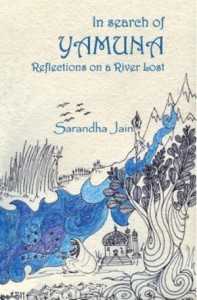Yamuna means many things to Indians. Especially to people who live closer to it. There are concerns about it being reduced to a dirty stream, which no longer looks like the river of our imagination. The Yamuna being the subject of the book makes you reach out for this book In search of Yamuna. And you want to know more about this river.
Having written by a very young author and someone who works for an environmental organization the book carries its own biases. The author’s mind is trained in development vs environment debate. And some words like neo-liberalism seem to have caught her fancy. The book is based on half-baked research where the purpose of the research is not even clear. While she condemns all development blindly and wants no flyovers, no big buildings, no industry, no Delhi metro she is very proud of her father’s chauffeur driven car. And is probably ignorant of the fact that the money she has liberally been brought up on came from a business that her father either owned or worked for.
She has asked a few questions repeatedly through the book. The questions that you usually hear from the environmentalist and are valid questions that the policymakers and government need to critically look at and provide answers to. But I have a question for the people who ask questions. Can you provide the alternate solution with your questions? For example, it is very easy to say use no plastic (to others, especially the poor people). But can you first give them an equally viable alternative? And then ask them to change. It is very easy for us to drive around in Chauffer driven cars and raise our fingers at public infrastructure like Delhi Metro. When you question the whole establishment, I want to know your credentials. What have you done to gain the legitimacy to ask those questions?

The romantic parts of the book that talks about the riverfront culture and the myths and stories associated with the river are scattered sporadically throughout the book. There is so much more to the Yamuna than the book has captured. If you look at the Puranas they would tell the story of Yamuna. Book talks repeatedly about the riverfront culture. Which in author’s mind seem to be a traditional place for recreation. Where people can come to the banks of the river and enjoy them. But at the same time she is opposed to the idea of amusement parks on the river, do I see confusion? She had a good story in tales of people who once lived on the banks of the river like the Pahalwans and the Dhobis. But she just scratches the surface there.
She did not make an effort to get into the minds and hearts of those people. And their connection with the river which at times is assumed in her own mind. One interview like interaction is not enough to know people who are very different from you.
The author probably did one journey from Yamunotri to Allahabad. The journey itself could have been a very strong thread in the book. But it has again been referred sporadically here and there. She could have captured the relationship or interactions of the people with the Yamuna across the length of the river. She could have captured the rituals that people perform to date to keep this relationship alive. If she had spent ample time, she would have established that connect with the riverfront people. That would have enriched her thoughts and hence her writing.
She seems to have been lost on the purpose of the book In search of Yamuna Reflections on a River Lost. Was it to thrash all the development happening in Delhi around Yamuna banks? Or was it to share her own perceived romance with the river? Did she want to share the science of a river or a romance as she keeps jumping between absolutely dry scientific facts and poetry in the same chapter? Most of the poetry seems to be borrowed or rather googled. Same sentences and same words have been repeated so many times that you feel as if you had misplaced the bookmark and are reading the same pages again.
The language is not uniform, sometimes it is ‘I’ and sometimes it is ‘We’. Some parts seem straight out of the other sources like the theory of culture. And you can see the inconsistency of language very clearly. The beginning is very impressively written, but the rest of the book falls through. A brave attempt on a topic that definitely needs to be written about. But deserves much more respect than this.
The book In search of Yamuna has a beautiful cover though, very aesthetically designed.









Thanks for the information.
I'd like to respond more elaborately once I read the book, but I would like to point that there's a difference between banning plastic and plastic bags.
It's not as obvious when it plays out in popular discourse, and this comes from those lobbying on behalf of ragpickers. It just doesn't seem to be justifiable on levels of toxicity alone. Again, not my field of expertise, but something to think about.